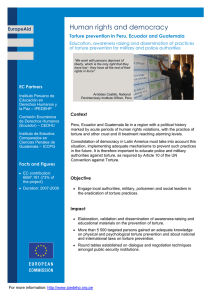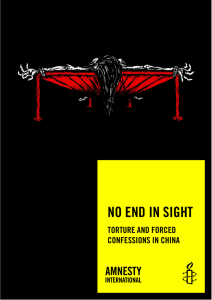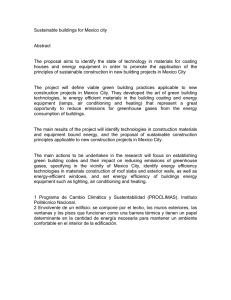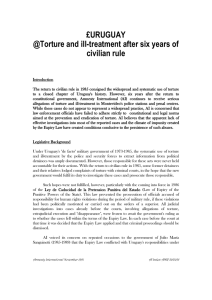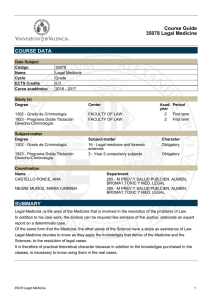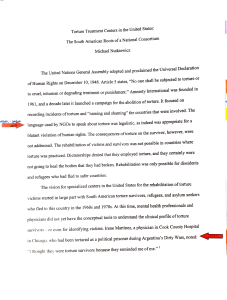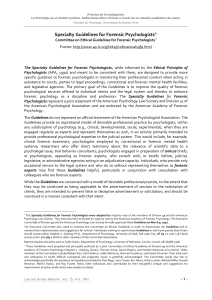Investigation of Torture and Ill
Anuncio
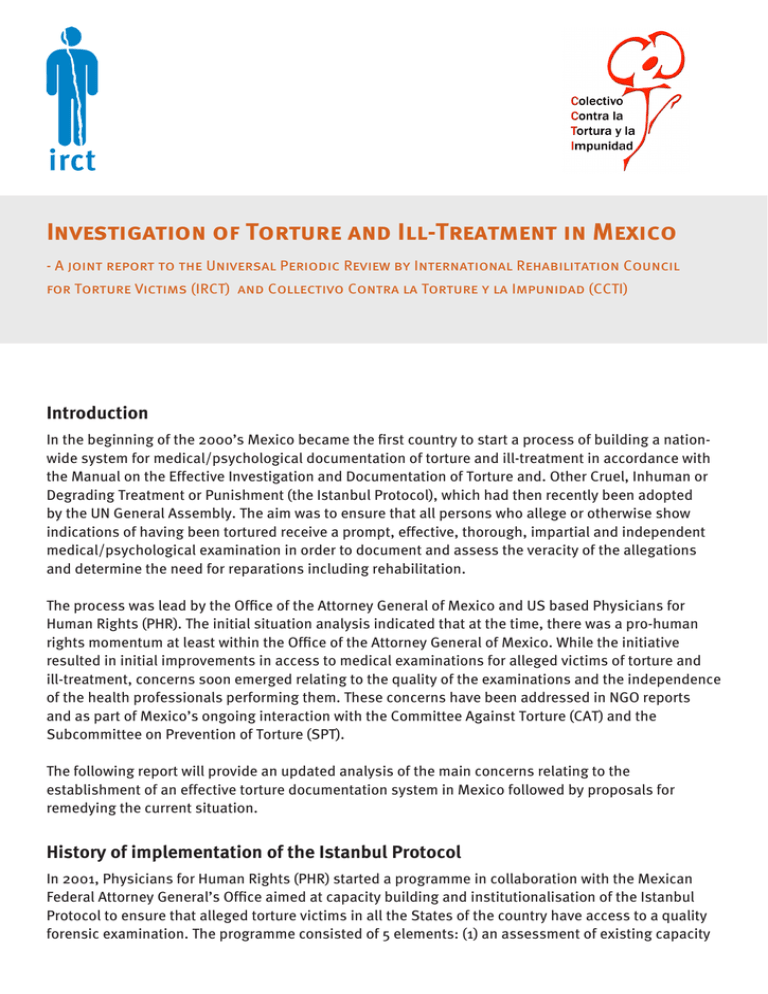
Investigation of Torture and Ill-Treatment in Mexico - A joint report to the Universal Periodic Review by International Rehabilitation Council for Torture Victims (IRCT) and Collectivo Contra la Torture y la Impunidad (CCTI) Introduction In the beginning of the 2000’s Mexico became the first country to start a process of building a nationwide system for medical/psychological documentation of torture and ill-treatment in accordance with the Manual on the Effective Investigation and Documentation of Torture and. Other Cruel, Inhuman or Degrading Treatment or Punishment (the Istanbul Protocol), which had then recently been adopted by the UN General Assembly. The aim was to ensure that all persons who allege or otherwise show indications of having been tortured receive a prompt, effective, thorough, impartial and independent medical/psychological examination in order to document and assess the veracity of the allegations and determine the need for reparations including rehabilitation. The process was lead by the Office of the Attorney General of Mexico and US based Physicians for Human Rights (PHR). The initial situation analysis indicated that at the time, there was a pro-human rights momentum at least within the Office of the Attorney General of Mexico. While the initiative resulted in initial improvements in access to medical examinations for alleged victims of torture and ill-treatment, concerns soon emerged relating to the quality of the examinations and the independence of the health professionals performing them. These concerns have been addressed in NGO reports and as part of Mexico’s ongoing interaction with the Committee Against Torture (CAT) and the Subcommittee on Prevention of Torture (SPT). The following report will provide an updated analysis of the main concerns relating to the establishment of an effective torture documentation system in Mexico followed by proposals for remedying the current situation. History of implementation of the Istanbul Protocol In 2001, Physicians for Human Rights (PHR) started a programme in collaboration with the Mexican Federal Attorney General’s Office aimed at capacity building and institutionalisation of the Istanbul Protocol to ensure that alleged torture victims in all the States of the country have access to a quality forensic examination. The programme consisted of 5 elements: (1) an assessment of existing capacity and attitude, (2) development of a standardised forensic evaluation form, (3) a training curriculum, (4) a country specific standardised manual on effective investigation and documentation of torture and ill-treatment, and (5) development of federal legislation establishing the necessary structures and procedures for using and monitoring the evidence. To date this is the most comprehensive programme of Istanbul Protocol implementation executed in a single country. An assessment of implementation efforts in Mexico, which was published by PHR in 2008 indicates some improvements especially in relation to the use of standardised reporting formats but also to some degree in the quality of documentation.1 However, the quality generally remained below the Istanbul Protocol standards.2 Further, the improvements were greatly overshadowed by more negative findings such as severe deficiencies in the documentation and conclusions of 4 forensic doctors from the same two districts3; worrying numbers of examinations taking place in circumstances that jeopardise the independence of the health professionals4; the denial of access for independent doctors from NGOs and the CNDH to conduct examinations5; and the view by the majority of the forensic physicians that negative findings are proof that torture did not occur6 - a position that has resulted in alleged victims being labelled as making false accusations solely based on negative Istanbul Protocol findings7. In 2007, PHR ended its engagement with the Attorney General’s office due to its denial of access for PHR to review the investigations of cases of alleged torture or ill-treatment as provided in their collaboration agreement.8 In parallel, PHR reports, the mechanism established by the government to monitor and evaluate the quality of forensic reports was only conducting superficial evaluations, which were characterised by statistics gathering rather than analytical quality control.9 In combination, these problems are indicative of a system where the health professionals do not have structural nor operational independence. Even qualified health professionals are not able to deliver quality forensic reports at least partly due to their lack of independence and independent health professionals are denied access to document alleged victims. The problems highlighted by PHR in 2008 have remained since then and there has been no real effort by the government to implement the recommendations from CAT and SPT regarding the Istanbul Protocol implementation. Annex 1 to this report contains a compilation of recommendations made by UN bodies to Mexico regarding the Istanbul Protocol. Key issues of concern The following section seeks to provide additional information to what is contained in the PHR report and summarised above. It will concentrate on three main aspects notably: effective access to examinations; promptness and thoroughness of examinations; and independence and monitoring of the examining bodies. 1 Forensic Documentation of Torture and Ill-Treatment in Mexico: An Assessment of the Implementation Process of the Istanbul Protocol Standards, paragraph 63 (https://s3.amazonaws.com/PHR_Reports/mexico-forensic-documentationtorture-2008.pdf) 2 Ibid, pages 63-71 3 Ibid, pages 68-69. 4 Ibid, page 16 5 Ibid, page 77 6 Ibid, page 22 7 Report on the visit of the Subcommittee on Prevention of Torture and Other Cruel, Inhuman or Degrading Treatment or Punishment to Mexico, CAT/OP/MEX/1(31 May 2010), paragraph 97 8 Forensic Documentation of Torture and Ill-Treatment in Mexico: An Assessment of the Implementation Process of the Istanbul Protocol Standards, page 8 9 Ibid, pages 72-73 Effective access to examination While much has been done to extend the possibility of a forensic medical evaluation of torture allegations to all persons in Mexico, there are still significant shortcomings. At the time of writing, only 12 Mexican states have formally adopted the Istanbul Protocol and established the obligation for the investigative bodies (Ministerio Público) to request a medical-psychological examination according to the Istanbul Protocol for all allegations of torture. In these states the medical-psychological examination does not constitute an obligatory element in the investigation of torture. Even in the states that have adopted the Istanbul Protocol, the Public Prosecutors offices frequently do not ask for an Istanbul Protocol examination and hence do not comply with the procedures of torture investigation. This failure to comply with the regular investigation procedures violates the right of the victim to an effective and thorough investigation of torture allegations. Further, the absence of sanctions or disciplinary measures for the investigators in charge of these cases promotes noncompliance. Prompt and thorough examination Lack of prompt execution of forensic medical examinations, is a serious problem in the investigations of torture and ill-treatment since physical symptoms on the victims may degrade fairly rapidly. A recent report by Human Rights Watch states that many investigators of the Public Prosecutors office they interviewed did not even know about the Istanbul Protocol.10 Even among those that are aware of of the Istanbul Protocol and the obligation to instigate forensic medical examinations, there appear to be a general reluctance to do so. Therefore, examinations are often only ordered if the victim offers an independent examination as evidence. Jorge Hernández Mora, Mario Ricardo Antonio Almanza Cerriteño, Sergio Rodríguez Rosas, José María Cirilo Ramos Tenorio, Oswaldo Francisco Rodríguez Salvatierra were detained on August 13, 2002, by the State Police of Tlaxcala, accused of kidnapping and tortured in order to obtain a “confession” and sentenced to 60 years of prison. In 2006 the State Commission for Human Rights of Tlaxcala emitted a recommendation urging the authorities to start an investigation, nevertheless the State Public Prosecutor closed the case without having ordered the application of the Istanbul Protocol. With the intervention of CCTI and other NGO’s the case has been reopened, nevertheless up to date the State Public Prosecutor has not ordered the application of the Istanbul Protocol and rejected independent medical-psychological reports. Many states do not have qualified forensic experts to carry out Istanbul Protocol examinations and have to forward the petition to the federal level. Even when this happens, the Attorney General’s Office does not have a sufficient number of forensic experts to fulfil the demand. This leads to a situation where prompt examinations are not possible (resulting in deterioration of physical evidence). This is especially important as many forensic experts and Public Prosecutors still consider the absence of physical injuries as a proof that torture did not take place. 10 Human Rights Watch. Ni Seguridad. Ni Derechos, page 56 (2011) Marcelino Coache, a union activist, was detained and suffered torture on March 4, 2009 in the State of Oaxaca. Due to the lack of forensic experts the State Public Prosecutor from Oaxaca, asked for the intervention of experts from the Federal Public Prosecutor. The exam took place in May 2010, more than one year after the alleged torture. The medical report found no physical evidence of torture, and rejected to consider the medical reports from a public hospital where Marcelino Coache had received emergency care for the serious injuries caused by torture. Although the government alleges that a great effort was made to train their forensic experts on state and federal level, the technical quality of the examinations is still deficient. Especially, the sections in the forensic medical reports dedicated to documentation and conclusion are often superficial and has significant shortcomings. This indicates that the knowledge and capacities gained through training are not put into practice and do not result in improved quality of the documentation. In forensic medical examinations carried out by forensic personnel of the Attorney General the examiners behaviour and attitudes establish conditions that are highly retraumatizing for the victims and thus do not lead to reliable conclusions. Barbara Italia Mendez was detained and sexually tortured on May 4, 2006 in San Salvador Atenco, giving public testimony of the severe torture she and many of the other detained women suffered during detention and transfer to prison. Nevertheless the Istanbul Protocol examination was realized one year after by health personell of the Attorney General. The examination was highly retraumatizing, she was obliged to take off her clothes to take photographs meanwhile she was told “You have nothing!” In this situation she heard voices from a large group of male police officers coming from a room next door where they attended a course on Human Rights. The psychological evaluation included a series of humiliating questions and comments: “Don’t you feel responsible for what happened to you?” “Why were you out in the street?” “You put yourself in danger.” CCTI health professionals regularly produce Istanbul Protocol examinations that victims try to have submitted to before the courts. A comparison between these reports and those prepared by the Attorney General’s office show a worrying discrepancy in the conclusions. Out of the 15 reports with findings of torture presented by CCTI to a court, only in one case the examination produced by the forensic experts of the Attorney General’s office also found evidence of torture. Independence and Monitoring While many of the deficiencies in the Istanbul Protocol examination reports appear to be linked to a lack of skills with the health professionals in the Attorney General’s office, there are indications that a lack of independence of the health professionals may also be a contributing factor. The study conducted by PHR clearly illustrates that there are serious concerns about the ability of government employed forensic physicians to perform their duties independently and are often exposed to undue pressure from other investigative bodies.11 Such pressure could at least partly explain the lack of quality of the Istanbul Protocol examination reports. 11 Forensic Documentation of Torture and Ill-Treatment in Mexico: An Assessment of the Implementation Process of the Istanbul Protocol Standards, page 69. The mechanism established by the government to monitor and evaluate the application and quality of forensic reports is presided by the Attorney General, who names the other members of the Committee, all of them belonging to different areas of the Attorney General’s Office, leading to a complete lack of operational and structural independence of the Committee. Not only professionals of the same institution that committed torture are in charge of investigating it, the mechanism that should monitor and evaluate the correct application of the IP, is also composed of high rank officials of the same institution. Since the creation of the Committee in 2003, there has been no transparency of its work and the public has no access to reports or information regarding the application of the Istanbul Protocol. When established, the monitoring Committee was meant to guarantee the quality and independence of the examinations but in its current format this is not possible. Recommendations The Government of Mexico should ensure that as part of any torture investigation, all alleged victims of torture and ill-treatment have effective access to a prompt, effective, thorough, independent and impartial forensic medical examination in accordance with the Istanbul Protocol including through: a) Formal adoption of the Istanbul Protocol by all Mexican States and elaboration of the necessary procedures for its implementation; b) Ensuring sufficient availability of qualified health professionals, implementing basic safeguards for alleged victims to exercise their right to en examination, including the right to see a doctor in the “Miranda” rights read to persons detained, and introducing administrative sanctions for investigational delays; c) Ensuring prompt and effective access for independent health professionals to persons in detention, including access with the necessary medical equipment to perform medical exams and take photographs and ensuring that Istanbul Protocol examination reports produced by independent and qualified health professionals are considered on an equal footing with State produced reports in the judicial process. d) Training a sufficient number of health professionals in torture documentation in accordance with the Istanbul Protocol. e) Establishing structurally and functionally independent forensic services with and independent mechanisms to monitor its performance and take corrective action including the possibility of ordering capacity building and instituting professional accountability or criminal proceedings where relevant. The body must be composed of representatives of all relevant stakeholders and operate with full transparency.
